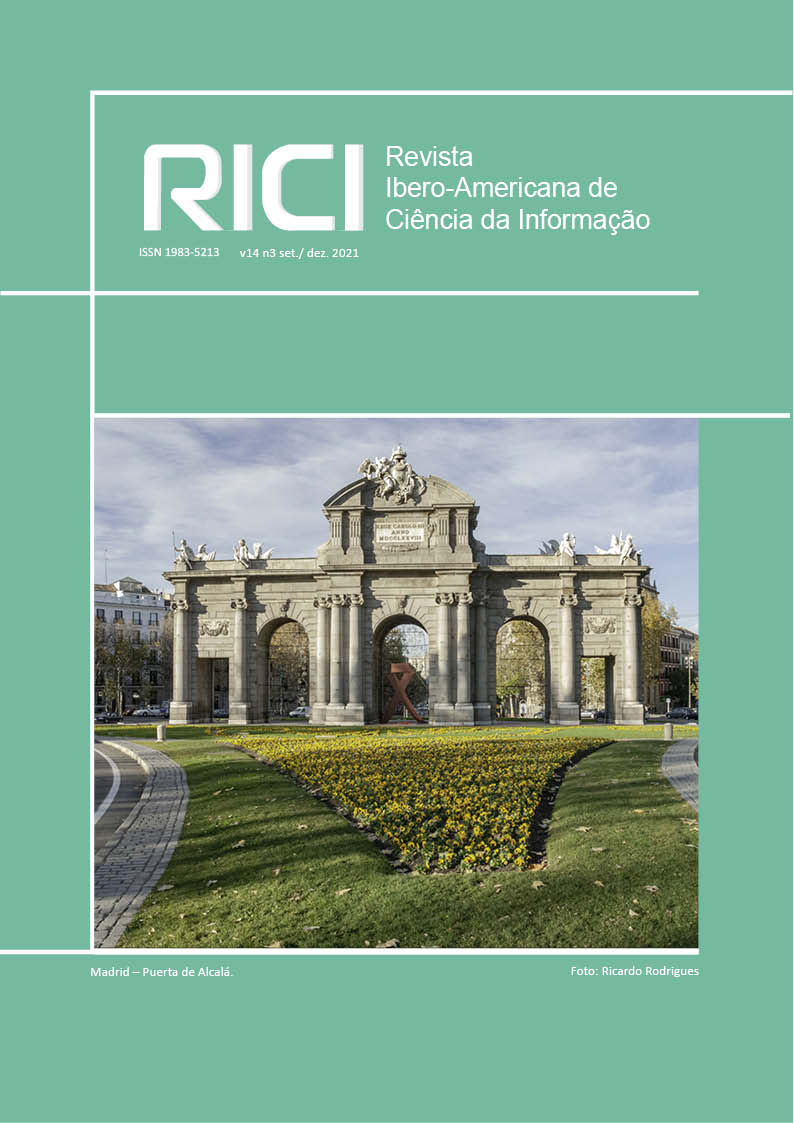Detecting and avoiding plagiarism in an academic context
description of a project developed within an undergraduate course in Information Science
DOI:
https://doi.org/10.26512/rici.v14.n3.2021.36185Keywords:
Information Science, Academic plagiarism, Plagiarism detection, Project based learningAbstract
A proposal for an intervention project to avoid academic plagiarism settled, using a project-based learning approach, in a curricular unit of an Information Science undergraduate course is presented. Theoretical context is based on a literature review on the concept of plagiarism and on digital tools for detecting plagiarism. The methodology and objectives of the project to detect and avoid plagiarism are described, and the outputs from its implementation are presented. Special emphasis is placed on the identification, analysis and evaluation of 10 digital plagiarism detection tools, based on a grid of criteria defined for this purpose. This procedure resulted in the selection of the three best tools (PlagScan, Urkund and Plag.pt), which are presented in more detail. In addition, materials designed to be used in a strategy to avoid plagiarism in an academic community are presented. The relevance of the work is based on the testimony of innovative didactic practices in an Information Science graduate course, through the use of project-based learning. The spreading and evaluation of plagiarism detection tools, framed in a broader strategy to fight plagiarism in an academic environment, is also a relevant output of this paper.
Downloads
References
ALMEIDA, F. et al. A fraude académica no ensino superior em Portugal: um estudo sobre a ética dos alunos portugueses. Coimbra: Imprensa da Universidade de Coimbra, 2015.
APARAC-JELUŠIC, T.; KURBANOGLU, S. Innovative approaches to teaching and learning in library and information science. Education for Information, v. 35, n. 2, p. 53-63, 2019.
ARAÚJO, E. O plágio na pesquisa científica do ensino superior. Revista Conhecimento em Ação, v. 2, n. 1, p. 93-107, 2017.
BARUCHSON-ARBIB, S.; YAARI, E. Printed versus Internet plagiarism: a study of students’ perception. International Journal of Information Ethics,v. 1, n. 6, p. 29-35, 2004.
BESSA, J. C. R. Entre citação, autoria e plágio na escrita científica de pós-graduandos. Lingüística, v. 34, n. 2, p. 99-118, 2018.
BODI, S. Ethics and information technology: Some principles to guide students. Journal of Academic Librarianship,v. 24, n. 6, p. 459-463, 1998.
CHOWDHURY, H. A.; BHATTACHARYYA, D. K. Plagiarism: taxonomy, tools and detection techniques. In: NATIONAL CONVENTION ON KNOWLEDGE, LIBRARY AND INFORMATION NETWORKING (NACLIN’16), 19th. Proceedings.. Disponível em: http://arxiv.org/abs/1801.06323. Acesso: 24 jan. 2021.
ERET, E.; GOKMENOGLU, T. Plagiarism in higher education: a case study with prospective academicians. Procedia - Social and Behavioral Sciences, v. 2, n. 2, p. 3303–3307, 2010.
FISHMAN, T. We know it when we see it is not good enough: toward a standard definition of plagiarism that transcends theft, fraud, and copyright. In: ASIA PACIFIC CONFERENCE ON EDUCATIONAL INTEGRITY, 4th. Proceedings. Disponível em: https://www.bmartin.cc/pubs/09-4apcei/4apcei-Fishman.pdf. Acesso: 24 jan. 2021.
GLENDINNING, I. Responses to student plagiarism in higher education across Europe. International Journal for Educational Integrity,v. 10, n. 1, p. 4-20, 2014.
HAGE, J.; RADEMAKER, P.; VUGT, N. Van.A comparison of plagiarism detection tools.Disponível em: http://www.cs.uu.nl/research/techreps/repo/CS-2010/2010-015.pdf Acesso: 24 jan. 2021.
JEREB, E. et al. Factors influencing plagiarism in higher education: a comparison of German and Slovene students. PLoS ONE, v. 13, n. 8, p. 1-16, 2018.
KOKKINAKI, A. I.; DEMOLIOU, C.; IAKOVIDOU, M. Students’ perceptions of plagiarism and relevant policies in Cyprus. International Journal for Educational Integrity,v. 11, n. 3, p. 1-11, 2015.
KRAUSS, J.; BOSS, S.Thinking through project-based learning: guiding deeper inquiry. Thousand Oaks: Corwin, 2013.
LIMA, E. de C. Análise de técnicas e ferramentas de detecção de plágio, e desenvolvimento de um protótipo de nova ferramenta. Monografia de graduação - Universidade Federal de Lavras, Lavras, 2011.
LÖFSTRÖM, E.; KUPILA, P. The instructional challenges of student plagiarism. Journal of Academic Ethics, v. 11, n.3, p. 231-242, 2013.
MEDINA, R. D.; ARENHARDT, C. P. B. Detecção de indícios de plágio nos trabalhos acadêmicos: um software para auxiliar e automatizar o processo. Revista Eletrônica em Gestão, Educação e Tecnologia Ambiental, v. 12, n. 12, p. 2547-2559, 2013.
MORAES, R. O plágio na pesquisa acadêmica: a proliferação da desonestidade intelectual. Revista Diálogos Possíveis, v. 3, n. 1, . 91-109,2004.
SANCHES, T. Citar e referenciar: uma estratégia formativa para o uso ético da informação e prevenção do plágio em meio académico. Perspectivas em Ciência da Informação, Belo Horizonte, v. 24,n. 3, p. 59-72, 2019.
SANCHEZ, O. P.; INNARELLI, P. B. Desonestidade acadêmica, plágio e ética. GV-executivo, v. 11, n.1, p. 46-49, 2012.
SILVA, O. S. F. Entre o plágio e a autoria: qual o papel da universidade? Revista Brasileira de Educação, v. 13, n. 38, p. 357-368, 2008.
SOUSA-SILVA, R.; ABREU, B. B. Plágio: um problema forense. Language and Law=Linguagem e Direito, v. 2, n. 2, p. 90-113, 2015.
VIANA, C. Universidade de Coimbra suspendeu 77 estudantes devido a plágio e fraude. PÚBLICO, Porto,22 nov. 2018. Disponível:URL: https://www.publico.pt/2018/11/22/sociedade/noticia/universidade-coimbra-suspendeu-77-estudantes-devido-plagio-fraude-1852019 Acesso: 24 jan. 2021.
Downloads
Published
How to Cite
Issue
Section
License
Copyright (c) 2021 Ana Lúcia Terra, Diogo Moreira, Filipa Gomes

This work is licensed under a Creative Commons Attribution 4.0 International License.
Copyright Notice
Authors who publish in this journal agree to the following terms:
- Authors retain copyright and grant the journal right of first publication with the work simultaneously licensed under the Creative Commons Attribution License 4.0, allowing the sharing of work and recognition of the work of authorship and initial publication in this journal.
- Authors are able to take on additional contracts separately, non-exclusive distribution of the version of the paper published in this journal (ex.: distribute to an institutional repository or publish as a book), with an acknowledgment of its initial publication in this journal.
- Authors are permitted and encouraged to distribute their work online (eg.: in institutional repositories or on their website) at any point before or during the editorial process, as it can lead to productive exchanges, as well as increase the impact and citation the published work.
















